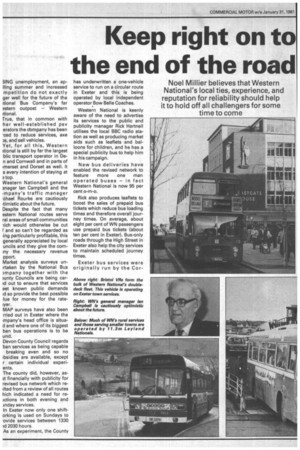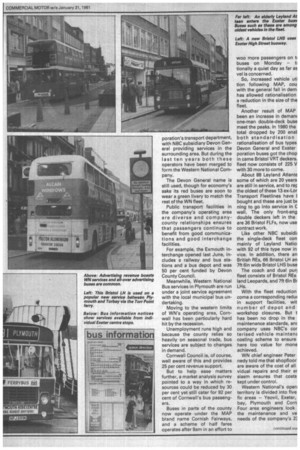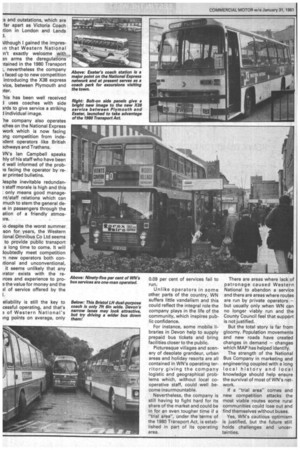Keep right on to the end of the road
Page 38

Page 39

Page 40

If you've noticed an error in this article please click here to report it so we can fix it.
Noel Millier believes that Western National's local ties, experience, and reputation for reliability should help it to hold off all challengers for some time to come
31NG unemployment, an aplling summer and increased mpetition do not exactly ger well for the future of the itional Bus Company's far astern outpost — Western
lion a I.
True, that in common with her well-established psv erators the cbmpany has been -ced to reduce services, axe )s, and sell vehicles.
Yet, for all this, Western itional is still by far the largest blic transport operator in Den and Cornwall and in parts of imerset and Dorset as well. It s every intention of staying at stop.
Western National's general 3nager Ian Campbell and the Impany's traffic manager chael Rourke are cautiously itimistic about the future.
Despite the fact that many astern National routes serve ral areas of small communities lich would otherwise be cut f and so 'can't be regarded as ing particularly profitable, this generally appreciated by local unciis and they give the cornIny the necessary revenue pport.
Market analysis surveys un!rtaken by the National Bus )mpany together with the )unty Councils are being card out to ensure that services eet known public demands id so provide the best possible lue for money for the rateiyer.
MAP surveys have also been rried out in Exeter where the Impany's head office is situad and where one of its biggest ban bus operations is to be und.
Devon County Council regards ban services as being capable breaking even and so no Ebsidies are available, except r certain individual experients.
The county did, however, asat financially with publicity for revised bus network which reilted from a review of all routes hich indicated a need for reKtions in both evening and inday services.
In Exeter now only one shiftorking is used on Sundays to .ovide services between 1330 Id 2030 hours.
As an experiment, the County has underwritten a one-vehicle service to run on.a circular route in Exeter and this is being operated by local independent operator Bow Belle Coaches.
Western National is keenly aware of the need to advertise its services to the public and publicity manager Rick Hartnell utilises the local BBC radio station as well as producing market aids such as leaflets and balloons for children, and he has a special publicity bus to help him in his campaign.
New bus deliveries have enabled the revised network to feature more one man operated buses — in fact Western National is now 95 per cent o-m-o.
Rick also produces leaflets to boost the sales of prepaid bus tickets which reduce bus loading times and therefore overall journey times. On average, about eight per cent of WN passengers use prepaid bus tickets (about ten per cent in Exeter). Bus-only roads through the High Street in Exeter also help the city services to maintain scheduled journey times.
Exeter bus services were originally run by the Cor poration's transport department, with NBC subsidiary Devon General providing services in the surrounding area. But during the last ten years both these operators have been merged to form the Western National Company.
The Devon General name is still used, though for economy's sake its red buses are soon to wear a green livery to match the rest of the WN fleet.
Public transport facilities in the company's operating area are diverse and companycounty relationships ensures that passengers continue to benefit from good communications and good interchange facilities.
For example, the Exmouth interchange opened last June, includes a railway and bus stations and a bus depot and was 50 per cent funded by Devon County Council.
Meanwhile, Western National Bus services in Plymouth are run under a joint service agreement with the local municipal bus undertaking.
Moving to the western limits of WN's operating area, Cornwall has been particularly hard hit by the recession.
Unemployment runs high and because the county relies so heavily on seasonal trade, bus services are subject to changes in demand.
Cornwall Council is, of course, well aware of this and provides 25 per cent revenue support.
But to help ease matters further, a market analysis survey pointed to a way in which resources could be reduced by 30 per cent yet still cater for 92 per cent of Cornwall's bus passengers.
Buses in parts of the county now operate under the MAP brand name Cornish Fairways, and a scheme of half fares operates after 9am in an effort to
woo more passengers on ti buses on Monday — ti tionally a quiet day as far as vel is concerned.
So, increased vehicle uti tion following MAP, cou with the general fall in dem. has allowed rationalisation a reduction in the size of the fleet.
Another result of MAP been an increase in dernanE one-man double-deck buse meet the peaks. In 1980 the total dropped by 200 enak both standardisation rationalisation of bus types Devon General and Exeter poration buses got the chop in came Bristol VRT deckers. fleet now consists of 225 V with 30 more to come.
About 88 Leyland Atlante some of which are 20 years are still in service, and to rep the oldest of these 13 ex-Lor Transport Fleetlines have bought and these are just bE ning to go into service in C wall. The only front-eng double deckers left in the are 36 Bristol FLFs, now use contract work.
Like other NBC subsidii the single-deck fleet con mainly of Leyland Natio' with 92 of this type now in vice. In addition, there an British REs, 66 Bristol LH an 7ft 6in wide Bristol LHS buse The coach and dual purl fleet consists of Bristol REs land Leopards, and 7ft 6in Br LHs.
With the fleet reduction come a corresponding redur in support facilities, wit number of depot and workshop closures. But t has been no drop in the maintenance standards, am company uses NBC's cor tensed vehicle maintem costing scheme to ensure here too value for mane achieved.
WN chief engineer Peter nedy told me that shopfloor are aware of the cost of all vidual repairs and their er siasm ensures that costs kept under control.
Western National's open
territory is divided into five fic areas — Yeovil, Exeter, bay, Plymouth and Corn Four area engineers look the maintenance and ve needs of the company's 2::
:s arid outstations, which are far apart as Victoria Coach tion in London and Lands 1.
klthough I gained the impresrn that Western National n't exactly welcome arms the deregulations' itained in the 1980 Transport :, nevertheless the company ; faced up to new competition introducing the X38 express vice, between Plymouth and 3ter.
his has been well received i uses coaches with side 3rds to give service a striking i individual image.
he company also operates iches on the National Express work which is now facing )ng competition from inde;dent operators like British 3chways and Trathens.
VN's Ian Campbell speaks hly of his staff who have been it well informed of the probis facing the operator by rear printed bulletins.
)espite inevitable redundans staff morale is high and this : only means good managent/staff relations which can much to stem the general dele in passengers through the ation of a friendly atmos3.re.
lo despite the worst summer son for years, the Western :ional Omnibus Co Ltd seems to provide public transport
a long time to come. It will foubtedly meet competition -n new operators both conitional and unconventional,
it seems unlikely that any rator exists with the reirces and experience to pro the value for money and the 3I of service offered by the eliability is still the key to cessful operating, and that's 3. of Western National's ing points on average, only 0.09 per cent of services fail to run.
Unlike operators in some other parts of the country, WN suffers little vandalism and this could reflect the integral role the company plays in the life of the community, which inspires public confidence.
For instance, some mobile libraries in Devon help to supply prepaid bus tickets and bring facilities closer to the public.
Picturesque villages and scenery of desolate grandeur, urban areas and holiday resorts are all contained in WN's operating territory giving the company logistic and geographical problems which, without local cooperative staff, could well become insurmountable.
Nevertheless, the company is still having to fight hard for its share of the market and could be in for an even tougher time if a "trial area", under the terms of the 1980 Transport Act, is established in part of its operating area.
There are areas where lack of patronage caused Western National to abandon a service and there are areas where routes are run by private operators — but usually only when WN can no longer viably run and the County Council feel that support is not justified.
But the total story is far from gloomy. Population movements and new roads have created changes in demand — changes which MAP has helped identify.
The strength of the National Bus Company in marketing and engineering coupled with a long local history and local knowledge should help ensure the survival of most of WN's network.
If a "trial area" comes and new competition attacks the most viable routes some rural communities could lose out and find themselves without buses.
Yes, WN's cautious optimism is justified, but the future still holds challenges and uncertainties.




























































































